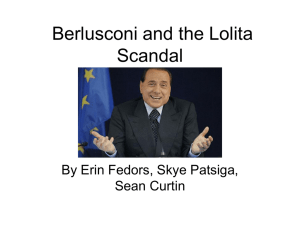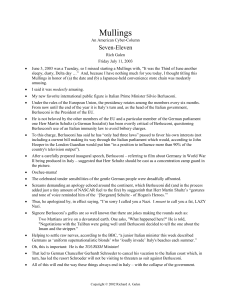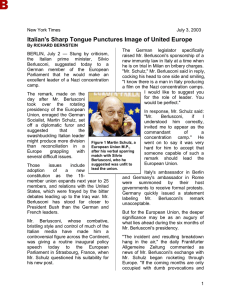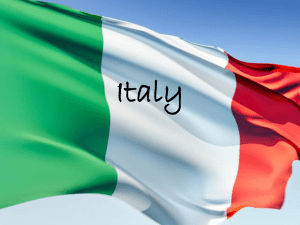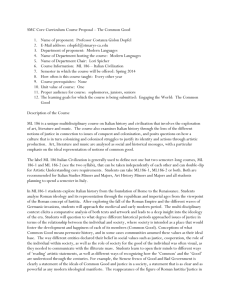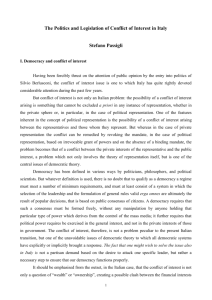Public relations in Italian political communication
advertisement
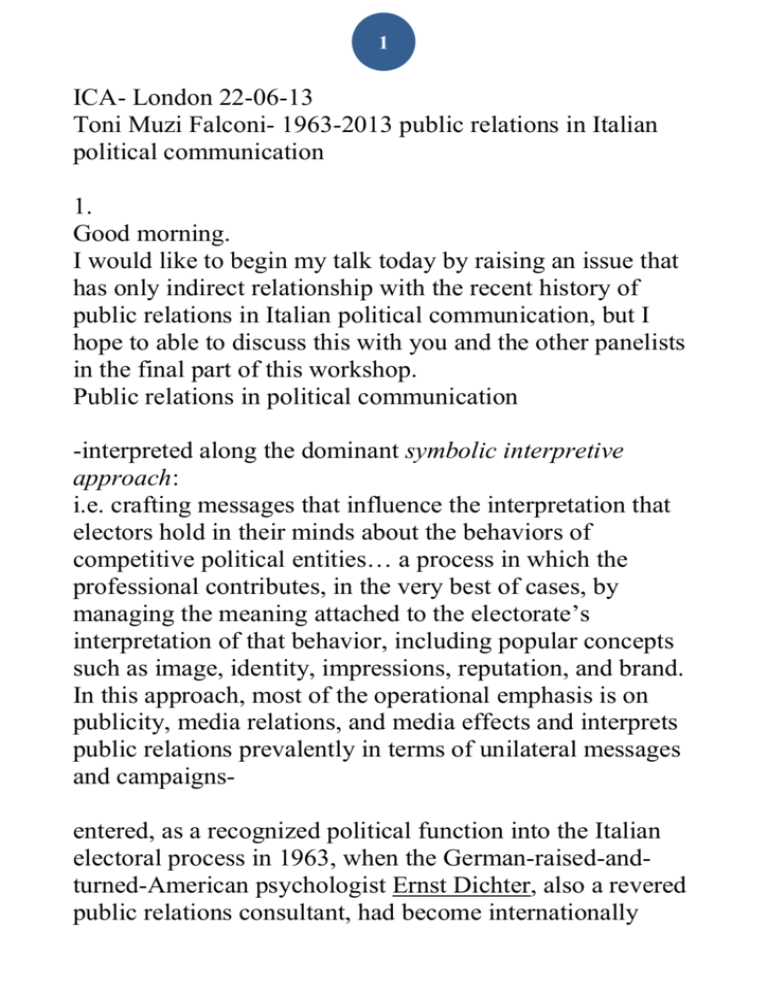
1 ICA- London 22-06-13 Toni Muzi Falconi- 1963-2013 public relations in Italian political communication 1. Good morning. I would like to begin my talk today by raising an issue that has only indirect relationship with the recent history of public relations in Italian political communication, but I hope to able to discuss this with you and the other panelists in the final part of this workshop. Public relations in political communication -interpreted along the dominant symbolic interpretive approach: i.e. crafting messages that influence the interpretation that electors hold in their minds about the behaviors of competitive political entities… a process in which the professional contributes, in the very best of cases, by managing the meaning attached to the electorate’s interpretation of that behavior, including popular concepts such as image, identity, impressions, reputation, and brand. In this approach, most of the operational emphasis is on publicity, media relations, and media effects and interprets public relations prevalently in terms of unilateral messages and campaignsentered, as a recognized political function into the Italian electoral process in 1963, when the German-raised-andturned-American psychologist Ernst Dichter, also a revered public relations consultant, had become internationally 2 reputed as a major protagonist of Vance Packard’s 1957 book where he was depicted as the subliminal ‘hidden persuader’, was summoned by the leading Italian political party, the Democrazia Cristiana, to help fight off the Communist Party’s offensive in the coming political elections. Fifty years later, during the most recent political elections of last February, the then Prime Minister Mario Monti, following his decision to form his own ‘civil society’ list (Scelta Civica), summoned David Axelrod of ObamaFame, for advice. As I will explain later, in both cases the results were highly disappointing. I don’t know if there is a lesson here to draw from…. but, having identified this analogy, I can’t help wondering if public relations in political communication –interpreted along the less dominant approach, the strategic behavioral management one… that posits that the role of the professional is instead to: a) listen-to and monitor specific potential electorates and general societal expectations of the candidate (reflective role); b) interpret such expectations with the candidate and participate in his/her decision making process as well as operationally implement those decisions (reflective role); c) involve and eventually engage those publics by enacting a policy/process of continued integrated multi-channel and multi-stakeholder reporting, facilitating their access and active feedback (integrated reporting process); d) ensure 3 that each function of the candidate’s team is coherently enabled with, and supported by adequate communicative competencies, resources and skills so that each may coherently create and develop direct constructive relationships with a selection of those publics (educative role); e) adopt, and constantly adapt, an aware and programmed generic principles and specific applications relationship policywould not have led to more effective results. 4 2.And now to Italy. What this analogy does however say is that, in both cases, the consultants, extremely busy in their own day-to-day activities back home, took the assignments very lightly indeed. In the first case, fifty years ago, Dichter came to Italy for a couple of days, interviewed a few pundits and left the more obvious advice, that was in turn, and to say the least, grossly interpreted by his client.. He told Bartolo Ciccardini, then in charge of the 1963 Christian Democratic campaign, that his party needed a much younger identity, explicitly referring to the average old age of its leadership team. The outcome was a poster plastered on every wall in Italy depicting a prosperous, yet prude, smiling young girl carrying a bouquet of country flowers under the headline ‘DC has turned 20’ (the party had in fact been formed in 1943). When Palmiro Togliatti, the charismatic leader of the rival Communist Party saw the poster, he immediately ordered his campaign manager Massimo Caprara to suggest to the tens of thousands of communist militants around the country to add on the poster with a graffiti pen a payoff saying: ‘and its now time to screw her!’ In the second case instead, fifty years later, Axelrod told Monti’s campaign manager Mario Sechi that the Premier’s public perception was much too sad, highbrow, serious and stiff upper lip. 5 Sechi delivered a poster (and, of course, facebook, twitter and other social media) depicting a smiling, warm and kitschy Mario Monti holding Empy, a small sruffy dog, in his arms. So much for the analogy. 1970 In January 1970, two months prior to the first ever regional elections of Italy, I wrote a 15 page contribution to L’Espressino, a supplement of the weekly newsmagazine L’Espresso, the first-ever extensive article on the political consultancy profession that was then only beginning to appear in Italy. The article covered in part the first conference of the newly formed International Association of Political Consultants that had just been held in Florence under the auspices of Italy’s liberal politician Emilio Pucci (the founder of the Pucci clothing brand) and of the IAPC’s first President, the reputed US democratic consultant John Napolitano; and for the remaining part a description of all the tools that at the time were available to communication experts and politicians and parties willing to pay for them to sway and influence the electorate. The article’s appearance sent shock waves across the Italian political scene but mostly upset the Espresso journalist guild representatives who vocally protested with the editor and with me accusing both of wanting to ‘americanize’ Italian politics! But the ball was moving. 6 1972 In the 1972 political elections I was assigned by the Italian Socialist Party (of which I was then an active militant) to professionally assist three candidates: two for the Senate (Franco Fossa for Genova and Gaetano Mancini for Cosenza) and one for the House (Antonio Canepa for Genova). Besides the usual paraphernalia: rallies, parties, leaflets, media relations and door to door, I implemented a few (at the time) innovative tactics. For example, I recruited ten young students, gave them as many (at the time..) tiny recording machines (called Gelosino) and a copy of the printed telephone directory asking each to call fifty different home numbers in the afternoon and in the evenings informing respondents of the caller’s identity and behalf of whom s/he was calling, asking them to listen to a two minute pre-recorded message from the candidate. The content of the message was something like ‘ good evening, I am Franco Fossa and please be so kind to take this number (number followed), and I would be happy to speak with you in person if you call me any morning from 8 to 10.’ Another one I used in Genova for both candidates was to import from France tens of thousands of mini plastic bottles with a magnetic part that would fix the object to the car driver’s door or windshield. Each plastic bottle had a label that said ‘here inside please find a message for you’ and tens of kids helped me insert into each a short printed message inviting the reader to vote for the candidate. Genova had (and has) two soccer teams (Genova and Sampdoria) and the central stadium attracted tens of thousands of spectators every Sunday (according to which 7 of the two teams was playing on home ground). Every car parked for the game, for four consecutive Sundays prior to election day, had one of these plastic bottles by the time the match ended. While we had no available way of estimating the impact of this idea, we were able to evaluate the ‘call me I would like to speak with you on the phone’ one. Some 50 thousand calls were made in one month and the candidate was obliged to add two more telephone lines in his house to cope with the traffic. Clearly this also drove his wife and son (who would later become deputy mayor of Genova) to entertain the voter on the line, while the candidate spoke with someone else. Without much difficulty we made the local media go wild with both actions and this helped both candidates win their seat. In Cosenza instead I devised a visual format that marked the candidate’s campaign in every possible channel and tool: a picture of Italy’s boot like geo-configuration turned upside down with the payoff: this is the way forward. Cosenza resulted exactly in the same position Milano was located and this evoked economic and financial progress. The Cosenza candidate also won the election. 1975 In 1975 Eugenio Scalfari the charismatic editor of L’Espresso found some financial backers and, on the wave of the 1975 local elections that were very favorable to the Italian communist party, decided to launch a new daily newspaper, in the understanding that the wave of consensus for the PCI implied the formation of a new left wing but not 8 yet communist but neither any more socialist public opinion to interpret. He had decided to name the paper La Repubblica and to issue the first number on January 14 of 1976, well in time for the political elections to come the spring of that year. We were good friends and in tandem with the great Italian creative director Emanuele Pirella, worked on a launch campaign that, to all effects, was in fact a political one. We organized a road show in 16 different Italian cities -two per week- in the months of November and December preceding the distribution of the first number. The road show was, to all effects, an early political campaign for the two parties of the left (in the beginning), then –in the second month- more and more leaning towards the communist party, while Scalfari, from his charismatic, financial, bourgeois, intellectual and liberal background, conveyed a message to the Italian elite that one could simplify in ‘trust the Italian communist party and its militants will definitely not push our children into the river…’ as the catholic party was, at the time, claiming. To draw another analogy with recent times, the road show – named Scalfagiro- had many similarities with the recent Beppe Grillo tsunami tour of 2013…… 1976 In that same year Berlusconi opened a private tv cable station (TeleMilano) in his just finished residential village Milano 2 in the outskirts of Milano. I thought it might be a good idea to approach him and his aides to earn some editorial space in his programs for my 9 socialist candidates Riccardo Lombardi (Senate) and Roberto Spano (House). Of course I knew that Berlusconi was close to Milano’s local socialist boss Bettino Craxi and in my dealings I however never advanced that my candidates were hostile to his ‘protector’, but I am also sure he checked before accepting my proposal. He accepted probably because he considered that the first time a private and clandestine tv station (with no legal authorization, but a good following) would stage an interview with representatives of the left of a major political party in the midst of an election would create, as it did, much noise and promote him at a national level. Both candidates were elected and, in the winter of that same year, Riccardo Lombardi decided an alliance with Craxi who had ovethrown the then party secretary De Martino, who had been humiliated by the communists in the outcome of the spring political election…. All through the end of the seventies and the entire eighties, Craxi dominated the socialist party. I resigned from that party after the 1976 elections and dedicated all my professional pr activities to the commercial sector. 1989 I was again much attracted to politics and its communication processes right after the fall of the Berlin wall in 1989, when the then secretary of the communist party, Achille Occhetto, publicly announced that he would not only change the name of the party, but pleaded to the Italian lay and liberal civil society to support him in this transformation. 10 Together with five other reputed opinion leaders of civil society (a poet, a philosopher, a trade unionist, the editor of a literary magazine and a gesuit priest) we formed an alliance and launched, through L’Espresso and with the support of La Repubblica, a manifesto inviting civil society to join us by forming -following the model of the clubs launched earlier in France by Francois Mitterand which had proven instrumental in winning him the presidency of the French Repubblic- clubs of likeminded civil society in every Italian city. In one month we registered the creation of 300 such clubs, and during the first general assembly of the movement, named Sinistra dei Club (clubs of the left), in February 1990 in Rome, as one of its co-promoters, I presented a communication platform based on the concept of the movement’s center as an interactive ongoing and continued back and forth phone callcenter system, in transition to the web that was then beginning to expand with the first listserves and e- mailing lists… The movement became very active for the following two years contributing also to the electoral reform in an alliance with Mario Segni (independent catholic promoter). As a sign of this alliance I became secretary of the June 9 Committee (day of the referendum) chaired by Segni and participated by reps from all lay parties, including the communists. In 1991 the communist party changed its name to ‘democratic party of the left’ (PDS) and integrated our movement. Those years also signed, notably in the northern and more developed part of the country, the popular and electoral 11 ‘rise’ of the Lega Nord a ‘populist’ movement that -in a schizophrenic yet permanent financially subjugated alliance with Silvio Berlusconi (see later)- played a significant role in turning the Italian political scenario from drama to farce. With the 1994 electoral reform moving towards a majoritary representation system, the relationship between the electorate and the individual candidate considerably modified the communicative terrain obliging political communicators to sharpen their tools and practices. This feature however lasted only a few years until a new electoral law interrupted any relationship between the single elector and the single candidate. It was the party who decided who would be elected. This, at a national level, is still in place, styming any creativity and inducing communicators to focus on slandering the competitive lists… SB Silvio Berlusconi’s direct entrance into active politics Come 1991/93 following the disappearance of the two major governmental parties (Christian democrats and socialists), wiped away by the clean hands corruption scandal, Silvio Berlusconi -the real-estate/show-business impresario, turned media-magnate and financial-mogulholding strong relationships with the two major ruling parties that had suddenly disappeared (christian democrats and socialists), was frightened that a then most likely electoral victory of the ex communist party (pds) would have endangered his financial empire and also led to criminal procedures against himself and his companies . 12 In 1993 he said ‘if I don’t go into politics, they will send me to jail and drive me bankrupt.’ He therefore allocated his best employees, substantial financial resources and striking communication abilities to form and launch a new party (Forza Italia) that actually won the 1994 elections through a highly effective campaign, thus inaugurating the Second Republic, an experience that concluded in November 2012, with the resignation of his fourth government, out of the eight that had led the country in the period 1994-2012, and today has become the leader of one of the two political parties that are leading the transition towards the third republic. Throughout his political career Berlusconi implemented with amazing effectiveness what he himself had recently (2009) referred to as a ‘cucu model’ of public relations. A model based on a highly sophisticated and planned network of relationship systems (joyous and candid, yet often sordid) stemming from a structurally populist culture of direct democracy that, in many instances, anticipated dynamics and trends that today are common to political leaderships in many western and eastern European countries. The expression of ‘cucu’ in fact originates in November 2008 when -at an italo-german summit in TriesteBerlusconi surprises Merkel by peekabooing her and jumping from behind a monument under the eyes of major international tv networks. Yet, all the concepts behind the model were already part of his narrative since 1980 when he had launched Publitalia 80, the advertising services company. 13 Coming from a career in real estate in Milano his cable tv station (Telemilano) was quickly transformed in 1978 into a local broadcasting channel called Canale 5, Berlusconi then absorbed the ailing local Rete 4 owned by Mondadori and Italia1, another local channel owned by publisher Rusconi- and therefore formed Publitalia 80, a television services advertising company. In that year advertising in Italy accounted for only 0.6 of gnp against 1.0 in France and 1.5 in the UK and Germany. Publitalia’s Ceo was Marcello Dell’Utri, an erudite and innovative Sicilian manager. In the nineties he would become member of Parliament, and in the first decade of this century would be indicted and condemned in a first and second judgment for being the vehicle between Berlusconi e and the Mafia. More recently, February 2012, he was acquitted in a third degree decision by the Court of Cassation, that however ascertained his active (‘defensive’, says the jury motivation for the acquittal) role in personally intermediating financial and political relationships between his boss and the mafia . In 1980, Dell’Utri recruited two consultants (myself and Antonio Pilati, a radical liberal intellectual who later became a major Berlusconi asset as prominent member of the national communication and then the antitrust authorities and is today a board member of RAI). The consultants’ mandate, in Berlusconi’s own words expressed at their first business meeting, was ‘to create Italy’s most advanced and innovative service company, firmly based on a culture of relationships’. The two assisted the company and its hundreds of young salespersons (many of whom subsequently became prominent local and national 14 politicians) in rationalising, absorbing and practicing what was then defined a ‘service culture’ , and which today one could (with some callous tweaks here and there) call a ‘relationship culture’. Every time the consultants met with Berlusconi they were amazed by his dynamic and relentless devotion to homework and, most importantly, to the strengthening of the relationship with his interlocutor. Berlusconi (honny soit qui mal y pense) would give every individual he related with, male or female, the impression that his only interest in life was to gain that interlocutor’s approval and empathy. The Publitalia ‘service culture’ quickly developed and became the ‘talk of the business community’. Every Publitalia employee - mostly, but not only, salespersons- adopted and constantly fed an ad hoc dynamic and electronic data-based system (it was 1980!) recording every single personal, mail or phone contact with prospects -mostly small and medium sized entrepreneurs in northern Italy who did not have sufficient budgets to advertise on national state television, but were highly attracted by the myriad of smaller and local private stations that had been sprouting all over the country since liberalization by the 1975 Maccanico bill that allowed only local tv stations. Italian consumers had thus begun to emancipate from the traditional and consolidated pauperistic and anticonsumerist values propagated by the two major Italian political cultures (catholic and communist), and that were very well reflected by the national state television’s programming. 15 By 1981, for every Publitalia prospect one could instantly trace birth date, patron saint, composition of family, principal advisors, financial resources…. and this data base was instantly updated with information stemming from the ongoing lunches, dinners, breakfasts, conversations… that formed a great part of each employee’s day-to-day activity. Being professionally trained to attract conversations also on the private side of things (a precise mandate by Berlusconi), the data bank became a repository of highly valuable information on the protagonists of Italy’s economic backbone. Publitalia also adopted an early tactic of making deals by accepting as payments future sales induced by tv advertising; of buying and then reselling shares of their clients companies; of stimulating investments through initially free editorial services. Basically the win-win argument was: you try for free, if you make money you give us a part. The company took off very quickly and definitely became Italy’s major and most admired services company. And boom it was! There was, however, one element missing: the very legitimacy of private local tv stations that were not allowed by law to connect to one other in real time. This was a major handicap and Berlusconi realized very well that his small (at the time) empire would inevitably collapse if the existing law -that ruled out any other national tv network save for the State’s- was ever to be really enforced. Therefore, it became clear to him that political interests 16 needed to be awakened in order to obtain a new regulation that would allow the growing private tv network to flourish. In the second part of the 80’s, the two most powerful political parties in the government were the christian democrats and the socialists. The communist party was at the opposition and, mostly out of disinterest!, played a substantially insignificant role in this issue. Berlusconi had always nurtured excellent relationships with Milano’s political bosses with whom he had ‘networked’ during his real estate activities to obtain and sell buildings and concessions. As said, during the seventies the socialist boss in Milano was Bettino Craxi, who became National Party Secretary in 1976. There was no particular ideological leaning towards him, as Berlusconi was (and is) a tough populist catholic dealmaker and very well entrenched in the culture of compromise typical of the christian- democrats. For many years on, countless attempts by Craxi to introduce the new regulation he had promised Berlusconi, were frustrated and delayed by the very powerful interests of the State owned RAI television company, by the left faction of the Christian Democrats and by the Communists. In the meantime however, the whole situation of the television market had become socially untenable as the growth and the success of Fininvest / Publitalia quickly became the most highly valued part of Italian popular culture in promoting values such as individualism, personal consumption and competition along with many bare female bodies and bold, populist and other vulgar sexual references. Also, Berlusconi had, at least in part, exchanged for political backing to his quest for a new regulation by giving 17 free editorial and advertising space to candidates of all parties for the frequent elections (local, regional, European and national). Eventually, come 1990, the Italian Parliament finally voted the Mammì law that gave legitimacy to this unique situation and sanctioned a duopoly of the national television market making it practically impossible for other players to enter. Today, in 2012, total tv represents some 55% of overall advertising investments, and the two major networks collect 75% of that. There are two other national channels (Sky, owned by Murdoch and La7, owned by Telecom Italia until last February) and together they collect only 12%!. Apart from Berlusconi and Dell’Utri’s thorough knowledge of the communication industry and how mass media impact opinions and behaviors of publics, over the years the two had also mastered the art of continued and daily (!) public opinion polling, comparing results from different vendors with varied political and cultural biases, through the formulation of slightly different questions to better capture the electorate’s gut-feelings in that very moment. This allowed Berlusconi, more than anyone else in Italian society, to direct a populist, vocally antiparty and anticommunist political agenda aligned with that gut – feeling, and to interpret and give it voice, before it became formed opinion. He also succeeded in consolidating the latter with his own personal narrative and an unprecedented direct access to mass media that lasted for a full seventeen years. This feature also gives a however elementary explanation of why, even in the most recent 18 elections, the majority of his electorate is formed by females….. In rationalizing years later (1999 ) in various public speeches his cucu model , Berlusconi would describe it (excerpts from different public speeches) as: “being open, understanding others and friendship are the pillars of the cucu policy, a term that I had first learned of from my friend Vladimir Putin and of which I am a very proud implementer. This is an effective policy that evokes a friendly relationship based on empathy, and -where there is friendship- it is easier to prepare grand decisions and resolutions. My cucu model implies -he continued- an attempt to understand others, one by one. My governments have done much to solve major international and national issues by a simple phone call and by reducing difficult and complicated political and bureaucratic barriers. The model implies a policy that stimulates in others friendship, esteem and empathy, a policy by which I have obtained many effective results…… a policy based on personal relationships, often on friendship and sometimes on affection with others political leaders.” Only to cite two of the tens of memorable episodes related to his international activities: °a day before an official encounter with the Obama’s in the USA Berlusconi was seen by a journalist as he was privately rehearsing in front of a mirror an expression of sexual admiration for Michelle by extending wide his arms with a great smile on his face as if to say, as a full blown Italian macho compliment ‘what a great piece of ass we have here…’ and this is exactly what he did the following 19 day at the encounter to Michelle’s visibly disdained and puritanic reaction….. and made world headlines. °as he was preparing to receive Gheddafi during one of the dictator’s official visits to Rome, Berlusconi sought the advice of an expert to show him the exact motions necessary to kiss in deference the Libyan’s hand. to the shock of the international community. Very little improvisation, as one may gather. Of course, the very serious financial crisis was the major cause for his decision to resign in November 2011 and leave to others the chore of implementing strict cost cutting measures that a populist would never consider, but his international reputation was at that point definitively shot. Thus the fall of his CUCU model. A fall that has however heavily permeated Italian political, economic and cultural communities with long term effects and consequences. To the point that, when he unexpectedly (for political analysts… but not for his closer associates) decided to reenter into active politics last November for exactly the same judiciary reasons that had pushed him in the first place to dive into it twenty years earlier, and in ten weeks succeeded in gaining 12 points versus his starting position and, subsequently managed for his party (pdl) to be the driving force of the new government…. even Italians, well versed and experienced in seeing his endless acrobatics, where surprised. 2010 As for me, I was recently (2010) involved in counseling the Liguria Regional campaign for pd’s Claudio Burlando, who 20 won by a tiny two percent margin over his opponent due to a sophisticated, yet only partly successful attempt to identify, relate with and involve past voters of the left who had in the last decade abandoned the ballot experience: the objective was to get these abstention votes back. What we did is -through the candidate’s active website, and virally via social media- call for recent absentee voters to identify themselves and actively return into political engagement by narrating their reasons for not having recently voted. We then asked the many responders from all over the region to participate to discussions on how the candidate could more effectively engage them for the formation of his platform and its post-election implementation. Clearly the unusual initiative caught the attention of the local as well as the national media, particularly in the digital environment. And this, in turn, produced a highly effective viral effect. In the 2012 Milano local elections that succeeded in returning, after many years, Milano to a center left coalition led by current Mayor Giuliano Pisapia, I gave a specific contribution to his victory in orchestrating a ‘here are my skeletons’ operation to anticipate and offset the exiting right wing mayor’s anticipated slander campaign dealing with my candidate having been jailed for a couple of days in the late seventies for ‘lateral support to political terrorism’, yet released a couple of days later. What we did is post on the candidate’s web site from very the beginning of the campaign a not so evident reference linked to a ‘here are my skeletons’ page where the inside story of a series of ‘questionable’ features to his life were narrated and accompanied by varied evidences, sources and documents. 21 As the campaign reached its peak we understood from various hints that the ‘having been in jail for support to terrorism’ story was about to break… so we quickly reached out to journalists and informed them of the web age that had been there from the beginning but that very few had visited, and invited them to accompany my candidate in a ‘memory’ visit to the shocking conditions of the inmates of Milano’s prison. Clearly this attracted much media attention and substantially deflated the impact of the outgoing mayor’s denunciation to the point that, when she attacked her opponent directly on tv, he very simply replied: I see you have not been following the news lately. All that needs to be said about this sad incident that I obviously very much regret, has already been said. And that was it. grillo You might be surprised that sofar I have only indirectly mentioned the role of Beppe Grillo and his M5S movement. Of course his relevance in the current political scene is very relevant and the use of public relations has certainly been instrumental to his success… managed by his ‘guru’ and partner Andrea Casaleggio, a pr professional by origin, become digital marketing entrepreneur. Grillo’s blog success has been widely studied and talked about since at least 8 years, mostly in other countries. While his directly political and electoral success is more recent, and maybe is already fading. 22 conclusion I say maybe because, and here I draw my conclusions: the dominant and holistic symbolic interpretive approach to public relations mentioned at the beginning of my talk, has probably exhausted its negative consequences by slamming down everyone’s throat, whether they like it or not, unilateral and mostly push and destructive contents that, in my view, have certainly convinced would be voters to not go to the polls and to distrust anything that even faintly resembles to politics…. As you know better than me, this is happening just about everywhere else wherever elections still exist. Drawing from a final analogy some may recognize, we could rationalize -as brilliantly suggested by my young colleague Fabio Ventoruzzo- that while our first republic (1963-1991) highlighted the Ivy Lee inspired public information model of public relations in political communication, and the second republic (1991-2012) the Ed Bernays inspired scientific persuasion one… we seem to be now in a transition to the third republic… and maybe it is time for a quick move to the Grunig inspired negotiation and strategic behavioral approach described at the beginning of my talk. Faute de mieux, I am sure we will in any case continue to follow -as we have over these last fifty years, in tandem with the other models mentioned- the traditional Barnum inspired press agentry model….. as our politicians will continue to reward our political consultants with ridiculous fees in exchange for post election lobbying favors. 23 A permanent practice in every country that greatly and opaquely contributes to the pollution of our democracies and which only political consultants could change if they really wanted to. Thank you
